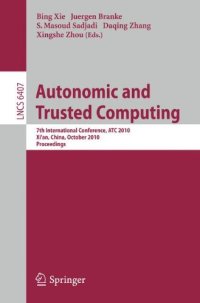
Ebook: Autonomic and Trusted Computing: 7th International Conference, ATC 2010, Xi’an, China, October 26-29, 2010. Proceedings
- Tags: Systems and Data Security, Software Engineering, Computer Communication Networks, Data Encryption, Information Systems Applications (incl.Internet), Management of Computing and Information Systems
- Series: Lecture Notes in Computer Science 6407 : Programming and Software Engineering
- Year: 2010
- Publisher: Springer-Verlag Berlin Heidelberg
- City: Berlin
- Edition: 1
- Language: English
- pdf
Computing systems including hardware, software, communication, and networks are becoming increasingly large and heterogeneous. In short, they have become - creasingly complex. Such complexity is getting even more critical with the ubiquitous permeation of embedded devices and other pervasive systems. To cope with the growing and ubiquitous complexity, autonomic computing (AC) focuses on self-manageable computing and communication systems that exhibit self-awareness, self-configuration, self-optimization, self-healing, self-protection and other self-* properties to the maximum extent possible without human intervention or guidance. Organic computing (OC) additionally addresses adaptability, robustness, and c- trolled emergence as well as nature-inspired concepts for self-organization. Any autonomic or organic system must be trustworthy to avoid the risk of losing control and retain confidence that the system will not fail. Trust and/or distrust relationships in the Internet and in pervasive infrastructures are key factors to enable dynamic interaction and cooperation of various users, systems, and services. Trusted/ trustworthy computing (TC) aims at making computing and communication systems––as well as services––available, predictable, traceable, controllable, asse- able, sustainable, dependable, persistent, security/privacy protectable, etc. A series of grand challenges exists to achieve practical autonomic or organic s- tems with truly trustworthy services. Started in 2005, ATC conferences have been held at Nagasaki (Japan), Vienna (Austria), Three Gorges (China), Hong Kong (China), Oslo (Norway) and Brisbane (Australia). The 2010 proceedings contain the papers presented at the 7th International Conference on Autonomic and Trusted Computing (ATC 2010), held in Xi’an, China, October 26–29, 2010.
This book constitutes the refereed proceedings of the 7th International Conference on Autonomic and Trusted Computing, ATC 2010, held in Xi'an, China, in October 2010. The 20 revised full papers presented together with 3 invited papers and 2 keynote abstracts were carefully reviewed and selected from 68 submissions. The papers address all current issues in autonomic, organic, and trusted computing, with special focus on theory and models, architectures and systems, components and modules, communication and services, as well as on tools and interfaces. They also feature actual research on trust models and specifications, trust-related security and privacy, trusted reliable and dependable systems, trustworthy services and applications, plus trust standards and non-technical issues